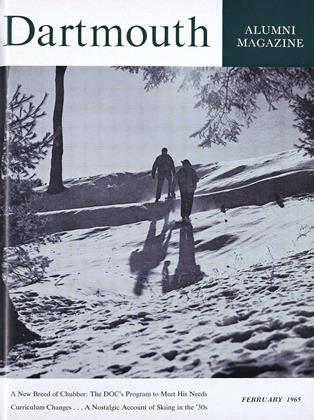Two new graduate programs leading to the doctoral degree were announced by the College with the opening of the winter term. The Department of Physics and Astronomy, which now offers the A.M. degree, has received Trustee approval to extend its graduate program to include the Ph.D. in physics. And the Dartmouth Medical School, now offering the Ph.D. in molecular biology, has received approval for a second doctoral program in physiology and pharmacology.
When the two new programs go into effect next fall, Dartmouth will have five doctoral programs in operation. Besides molecular biology, doctoral degrees in mathematics and engineering are currently being offered.
Prof. Leonard M. Rieser '44, Dean of the Faculty of Arts and Sciences and director of graduate study, said that both programs had been developed during several years' consideration by the faculty and trustees. A review of existing Ph.D. programs led to the conclusion that their quality and their effects on other departments indicated the timeliness of the new offerings.
About 50 graduate students will be involved in the new programs. Graduate enrollment in physics will be increased by 50 per cent to a total of about 25 students. In physiology-pharmacology about six students will be accepted each year for the four-year program.
Since the Department of Physics and Astronomy already has a strong graduate program leading to the master's degree, and research projects currently under way can accommodate the additional graduate students, few changes will be necessary to launch the Ph.D. program. The physics program will be unusual in its emphasis on individuality and independence in research and personal relationships between students and faculty. The research areas which are emphasized at Dartmouth are those, such as solid-state physics, which do not depend significantly on the organization of large teams of workers. These same areas of physics overlap with other disciplines, especially engineering and chemistry, and thereby both lend and gain strength by their relation with this other scientific activity at Dartmouth.
A particularly close relationship exists between the physics program and Dartmouth's Radiophysics Laboratory. A number of doctoral students will be working in ionospheric physics, plasma physics, and radio astronomy.
The Medical School's Departments of Physiology and Pharmacology, in proposing their program, noted that graduate education for the Ph.D. in the medical sciences and professional education for the M.D. degree are closely linked. One of the principles agreed on in 1955-56 when planning for the refounding and expansion of the Medical School began was that doctoral-degree work would be available.
The new program and the current molecular biology doctoral program, which last June produced the first Ph.D. degree Dartmouth has awarded since 1939, will both supplement and complement one another.
The graduate students in the new program will largely pursue research in areas of established interest to current faculty members. In the physiology-pharmacology area, 23 faculty members are engaged in research that includes general and animal physiology, regulatory phenomena, environmental biology, neuropharmacology, toxicology, permeability of epithelial barriers, and general and cellular pharmacology.
In physics and astronomy 14 faculty members, plus five more in radiophysics, are engaged in research that includes theoretical physics, solid-state physics, plasma physics, nuclear physics, low-temperature physics, biophysics and optics, and astronomy.
For the current academic year 81 men and women are enrolled in Dartmouth's graduate programs in biological sciences, chemistry, geology, mathematics, molecular biology, and physics. Of this total, 21 are working for the mathematics Ph.D. and 17 for the molecular biology Ph.D. Nine graduate students are from foreign countries.
 View Full Issue
View Full Issue
More From This Issue
-
 Feature
FeatureA NEW BREED OF CHUBBER
February 1965 By JOHN ALDEN THAYER JR. '65 -
 Feature
Feature"It Was Quiet, Serene, and Beautiful"
February 1965 By GEORGE R. ANDREWS '37 -
 Feature
FeatureBusiness Still Draws Its Share of Graduates
February 1965 By ADDISON L. WINSHIP '42 -
 Feature
FeatureFreshman-Sophomore Curriculum Revised
February 1965 -
 Article
ArticleTHE UNDERGRADUATE CHAIR
February 1965 By BOB WILDAU '65 -
 Article
ArticleDartmouth's Story Superbly Told
February 1965 By ALBERT I. DICKERSON '30







